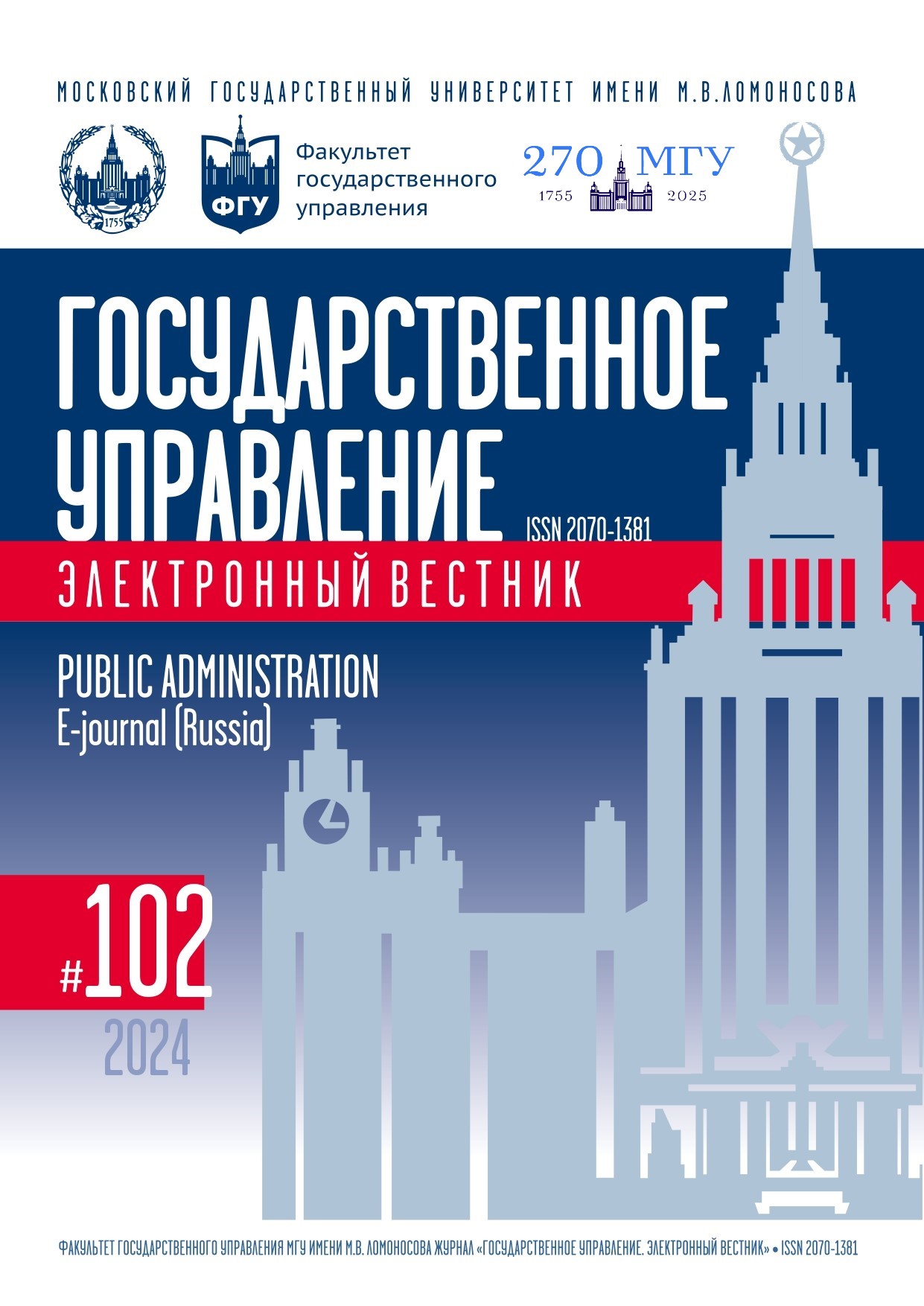Features of Innovation Processes in Public Administration Sector in Conditions of Digital Transformation of Russian Economy
Keywords:
Innovation, public administration sector, recipients of public services, digital transformation, e-government assessment methodology.Abstract
In the context of economy digital transformation, the development and implementation of projects to introduce innovations into the public administration sector are key tools for improving the quality of public services. This determines the relevance of studying the features of innovation processes and tools for managing them in the process of developing e-government. The article analyzes the directions of transformation of the processes of providing public services using technological and organizational innovations in the context of the public administration sector digitalization. The aim of the study is to further develop theoretical and methodological approaches to innovation and innovation processes in the public administration sector. In accordance with the aim of the study, the authors defined innovations in the public administration sector, presented their classification and identified their differences from innovations in the business sector. An analysis of the reasons hindering the introduction of innovations in the public administration sector was carried out. The growing role of interactions between government bodies and recipients of public services in ensuring the quality of the latter and in activating innovative processes in the sector being studied is substantiated. The author’s methodology for calculating the integral indicator of the effectiveness of interactions between government bodies and recipients of public services using the index method is presented. Conclusions are drawn about the possibility of using the proposed methodology in the development of program documents of the Russian state aimed at further developing e-government and improving tools for monitoring the quality of public services. To solve the research problems content analysis and system analysis were used, which made it possible to identify the features of innovation and innovative processes in the public administration sector and to justify the need for reengineering of the administrative processes. The obtained results can be used in further researches devoted to project management tools for reengineering administrative processes using digital innovations.
References
Афанасьев Р.С., Богданов Л.Н. Российские инновации в секторе государственного управления в международном контексте // Актуальные вопросы современной экономики. 2019. № 6–2. С. 35–42.
Барабашев А.Г. Кризис государственного управления и его влияние на основные административные парадигмы государства и бюрократии // Вопросы государственного и муниципального управления. 2016. № 3. С. 163–194.
Гребер Д. Утопия правил. О технологиях, глупости и тайном обаянии бюрократии. Москва: Ad Marginem; 2016.
Добрынин Н.М. Вновь к вопросу о государственном суверенитете и новой геополитике: аксиология права и размышления автора // Государство и право. 2019. № 5. С. 41–53. DOI: 10.31857/S013207690004859-6
Дэвенпорт Т. Внедрение искусственного интеллекта в бизнес-практику. Преимущества и сложности. Москва: ООО «Альпина Паблишер», 2021.
Иванова М.В., Якимчук Н.Н. Реинжиниринг административных процессов в органах государственной власти субъекта Федерации (опыт Ленинградской области) // Бизнес. Образование. Право. 2021. № 1(54). С. 143–153. DOI: 10.25683/VOLBI.2021.54.151
Купряшин Г.Л., Шрамм А.Е. О перспективах третьей волны парадигмы цифрового государственного управления // Государственное управление. Электронный вестник. 2021. № 84. С. 256–276. DOI: 10.24412/2070-1381-2021-84-256-276
Леонтьева Л.С., Романченко М.К. Трансформация репутационного капитала региона и власти Российской Федерации в условиях изменения политической ситуации в мире // Интеллект. Инновации. Инвестиции. 2023. № 4. С. 23–34. DOI: 10.25198/2077-7175-2023-4-23
Лихтин А.А. Трансформация государственного управления в условиях цифровизации // Управленческое консультирование. 2021. № 4. С. 18–26. DOI: 10.22394/1726-1139-2021-4-18-26
Майлс Й. Сервисные инновации в XXI веке // Форсайт. 2011. Т. 5. № 2. С. 4–15.
Никонов В.А. Задачи науки государственного и муниципального управления. К 30-летию факультета государственного управления МГУ имени М.В. Ломоносова // Вестник Московского университета. Серия 21. Управление (государство и общество). 2023. Т. 20. № 4. C. 3–13. DOI: 10.55959/MSU2073-2643-21-2023-4-3-13
Чесбро Г. Открытые инновации. Создание прибыльных технологий. Москва: Поколение, 2007.
Эффективность государственного управления / под общ. ред. С.А. Батчикова, С.Ю. Глазьева. Москва: Консалтбанкир, 1998.
Южаков В.Н., Покида А.Н., Зыбуновская Н.В., Старостина А.Н. Цифровизация взаимодействия граждан и государства: оценка гражданами эффектов, рисков и перспектив // Вопросы государственного и муниципального управления. 2023. № 2. C. 33–73. DOI: 10.17323/1999-5431-2023-0-2-33-73
Schumpeter J.A. The Theory of Economic Development: An Inquiry into Profits, Capital, Credit, Interest and the Business Cycle. New Brunswick (U.S.A), London (U.K.): Transaction Publishers, 1983.
Leydesdorff L., Etzkowitz H., Kushnir D. Globalization and Growth of US University Patenting, (2009–2014) // Industry and Higher Education. 2016. Vol. 30. Is. 4. P. 257–266. DOI: 10.1177/0950422216660253
Montagna J.M. A Framework for the Assessment and Analysis of Electronic Government Proposals // Electronic Commerce Research and Applications. 2005. Vol. 4. Is. 3. P. 204–219. DOI: 10.1016/j.elerap.2005.01.003
Windrum P. Innovation and Entrepreneurship in Public Services // Innovation in Public Sector Services: Entrepreneurship, Creativity and Management / ed. by P. Windrum, P. Koch. Cheltenham, UK: Edward Elgar Publishing, 2008. P. 3–20.

